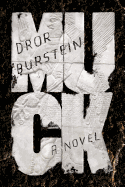
In modern-day Jerusalem, an aspiring poet named Jeremiah receives the rudest review any writer can get: a prominent critic smashes a computer keyboard over his head. That violent opening is but a hint of the fireworks to come in Israeli novelist Dror Burstein's Muck, a wildly imaginative retelling of the biblical book of Jeremiah.
In the sixth century BCE, the prophet foretold the destruction of the First Temple by the Babylonian king Nebuchadnezzar and the exile of the Jewish people to Babylon, one that lasted nearly 70 years. Instead of simply updating this well-known tale to the present, Burstein's conceit is to create a clever mashup of events in the ancient kingdom of Judah and contemporary Israel.
The realization of what Burstein (Netanya) is up to doesn't dawn all at once. But then references to a reigning monarch named Jehoiakim and long-dead kingdoms like Moab and Phoenicia insinuate their way into the narrative. Muck is also a cautionary tale about the perpetual quality of Middle East conflict, reflected in a conference in which Babylon's vassal states struggle to carve up the map as they contemplate what will happen when their dream of overthrowing their oppressor with Egypt's aid comes true.
And for anyone who wonders what it would be like to be granted the gift of prophecy, Burstein's Jeremiah hardly offers an encouraging role model. His apocalyptic message, delivered in a cafe among his fellow poets, garners him nothing but ridicule. Though we might wish for a more generous treatment, Burstein's energetic novel, to its credit, remains true to the spirit of its source material until the bitter end. --Harvey Freedenberg, freelance reviewer

